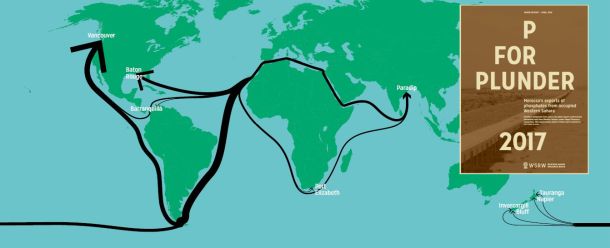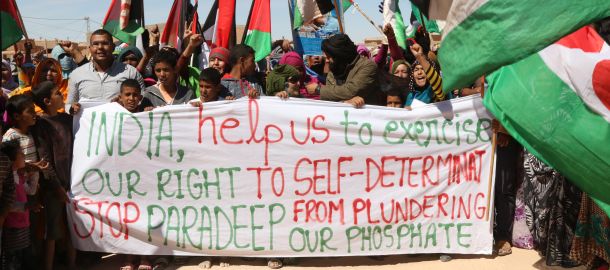
Covington & Burling, the US lobby law firm that lobbies for the Moroccan phosphate trade from occupied territory of Western Sahara travelled all the way to Oslo to explain to an investor how the Saharawis supposedly benefit from the trade. Still, the firm refuse to talk to Saharawis or civil society about the industry.
The American law firm Covington & Burling, which has defended a number of controversial clients in the past, has for a number of years been representing the Moroccan state phosphate company that carries out phosphate exploitation in occupied Western Sahara.
Representatives of the law firm travelled to Oslo together with their client last year to defend the phosphate trade from the territory. The trade is done in the disregard of the wishes and interests of the Saharawis, and is thus in violation of international law, and thus against the UN's legal opinion on the matter.
The meeting in Oslo on 24 August 2010, came as a consequence of Norway’s pension fund, the world’s largest sovereign wealth fund, questioned the ethics behind the trade. The visit was, however, unsuccessful for the law firm. 6 December 2011, the Norwegian Ministry of Finances stated that the trade does not benefit the Saharawis, and that it constitutes a “particularly serious violation of fundamental ethical norms”.
Covington & Burling’s so-called “independent opinions” of the trade have been used by phosphate importing firms to defend their unethical trade. Yet, the opinion has never been released to the public. The law firm consistently refuses to reply to requests from civil society or Saharawis.
“I want to see the opinion where they claim that the trade is to our benefit”, states Saharawi student Senia Bachir Abderahman.
Senia now studies public health in Oslo, Norway. She is surprised to know that the firm still claims to be an expert on what is to the benefit of the Saharawis. Abderahman has previously tried to meet with the law firm, without success (see video to the right).
“Until they start meeting Saharawis, they cannot be taken seriously as a credible expert on the situation of my people. Their report has no legitimacy at all, as long as it remains kept in secret from the Saharawis and the public” Abderahman stated.
She underlines that Saharawis in the occupied territories are being imprisoned for objecting to the trade, referring to the secretary-general of the Committee for the Protection of Natural Resources, Mr. Sidahmed Lemjiyed has been in prison soon for one year.
"I'm not obliged to respond to you. We're not engaging with you at all regarding anything at all. You're not my client, and as far as I can see you have no interest or stake in our company”, has Covington & Burling stated to WSRW. Read about WSRW’s efforts to get hold of the legal opinion.
The recommendation from the Council on Ethics explains that the much referred to opinion from Covington & Burling, was written on 4 October 2007, and carries the title ‘Legality of Phosphate Resource Development in the Sahara Region’.
The Norwegian report highlights the following quote from the company’s opinion: ‘the Kingdom of Morocco has complied with all the international legal obligations it could have as an administrating power, through the manner in which, both directly and through OCP, it has managed the phosphate resources in the Sahara region.’
Both the firms BASF and FMC Corp have admitted that their “legal advises” on Western Sahara phosphate trade have been written by Covington & Burling, and both refuse to share the opinion.
The Norwegian Ministry of Finances found the trade highly unethical and concluded that it cannot be said that the phosphate trade is to the benefit of the Saharawis. At the same time, they divested shares for 256 million Euros in the two companies FMC and PotashCorp.
New report: Western Sahara phosphate trade halved
The export of phosphate rock from occupied Western Sahara has never been lower than in 2019. This is revealed in the new WSRW report P for Plunder, published today.
New report on Western Sahara phosphate industry out now
Morocco shipped 1.93 million tonnes of phosphate out of occupied Western Sahara in 2018, worth an estimated $164 million, new report shows. Here is all you need to know about the volume, values, vessels and clients.
New report on contentious Western Sahara phosphate trade
Morocco shipped over 1.5 million tonnes of phosphate out of occupied Western Sahara in 2017, to the tune of over $142 million. But the number of international importers of the contentious conflict mineral is waning, WSRW's annual report shows.
New report on global phosphate trade from occupied Western Sahara
Over 200 million dollars worth of phosphate rock was shipped out of occupied Western Sahara last year, a new report from WSRW shows. For the first time, India is among the top importers.



